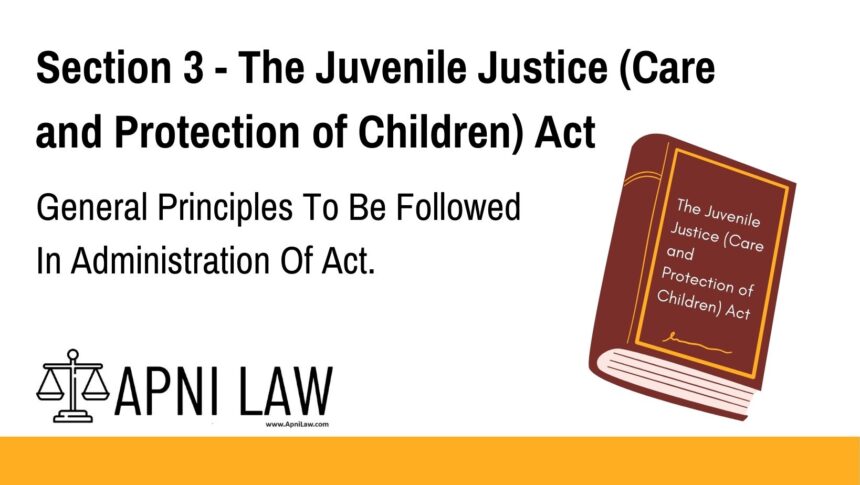Code
The Central Government, the State Governments, the Board, and other agencies, as the case may be, while implementing the provisions of this Act shall be guided by the following fundamental principles, namely:—
(i) Principle of presumption of innocence:
Any child shall be presumed to be innocent of any mala fide or criminal intent up to the age of eighteen years.
(ii) Principle of dignity and worth:
All human beings shall be treated with equal dignity and rights.
(iii) Principle of participation:
Every child shall have a right to be heard and to participate in all processes and decisions affecting his interest and the child’s views shall be taken into consideration with due regard to the age and maturity of the child.
(iv) Principle of best interest:
All decisions regarding the child shall be based on the primary consideration that they are in the best interest of the child and to help the child to develop full potential.
(v) Principle of family responsibility:
The primary responsibility of care, nurture, and protection of the child shall be that of the biological family or adoptive or foster parents, as the case may be.
(vi) Principle of safety:
All measures shall be taken to ensure that the child is safe and is not subjected to any harm, abuse, or maltreatment while in contact with the care and protection system, and thereafter.
(vii) Positive measures:
All resources are to be mobilized, including those of family and community, for promoting the well-being, facilitating the development of identity, and providing an inclusive and enabling environment, to reduce vulnerabilities of children and the need for intervention under this Act.
(viii) Principle of non-stigmatising semantics:
Adversarial or accusatory words are not to be used in the processes pertaining to a child.
(ix) Principle of non-waiver of rights:
No waiver of any of the rights of the child is permissible or valid, whether sought by the child or a person acting on behalf of the child, or a Board or a Committee; and any non-exercise of a fundamental right shall not amount to a waiver.
(x) Principle of equality and non-discrimination:
There shall be no discrimination against a child on any grounds including sex, caste, ethnicity, place of birth, disability, and equality of access, opportunity, and treatment shall be provided to every child.
(xi) Principle of right to privacy and confidentiality:
Every child shall have a right to protection of his privacy and confidentiality, by all means and throughout the judicial process.
(xii) Principle of institutionalisation as a measure of last resort:
A child shall be placed in institutional care as a step of last resort after making a reasonable inquiry.
(xiii) Principle of repatriation and restoration:
Every child in the juvenile justice system shall have the right to be re-united with his family at the earliest and to be restored to the same socio-economic and cultural status that he was in before coming under the purview of this Act, unless such restoration and repatriation are not in his best interest.
(xiv) Principle of fresh start:
All past records of any child under the Juvenile Justice system should be erased except in special circumstances.
(xv) Principle of diversion:
Measures for dealing with children in conflict with law without resorting to judicial proceedings shall be promoted unless it is in the best interest of the child or the society as a whole.
(xvi) Principles of natural justice:
Basic procedural standards of fairness shall be adhered to, including the right to a fair hearing, rule against bias, and the right to review, by all persons or bodies, acting in a judicial capacity under this Act.
Explanation
Section 3 establishes the fundamental principles that serve as the cornerstone of the Juvenile Justice Act.
These principles aim to safeguard the dignity, rights, and best interests of the child at every stage of the legal or welfare process. They focus on ensuring protection, participation, rehabilitation, and the promotion of the child’s full potential rather than punishment.
Illustration
Example:
If a 17-year-old is apprehended for a minor offense like trespassing,
-
Under the principle of presumption of innocence, he must be treated without preconceived bias.
-
The principle of fresh start allows his past minor mistakes to not haunt him legally once he reforms.
-
The system would prefer diversion programs such as counselling over formal imprisonment.
Common Questions and Answers
1. What is the key focus of Section 3 of the Juvenile Justice Act?
-
Answer: Protecting the child’s dignity, rights, and ensuring decisions are made in their best interest.
2. Are children treated differently from adults under this Act?
-
Answer: Yes, children are treated as vulnerable individuals needing care, protection, and rehabilitation rather than punishment.
3. What happens if a child refuses to cooperate in proceedings?
-
Answer: Authorities must still adhere to principles like dignity, participation, and natural justice without using coercive measures beyond what is lawful and proportionate.
4. Can past criminal records of a child be used against them?
-
Answer: No, according to the principle of fresh start, all past records should be erased, except in special circumstances.
Conclusion
Section 3 of the Juvenile Justice Act provides a comprehensive and humane framework that reimagines how the legal system should interact with children.
It prioritizes protection, rehabilitation, equality, and dignity over retribution.
The guiding principles ensure that every child is given the opportunity to reform, rebuild, and reintegrate into society, fostering a child-centric justice mechanism that upholds India’s constitutional and international obligations.
Proper adherence to these principles not only safeguards the rights of children but also contributes to a more just, empathetic, and progressive society.








